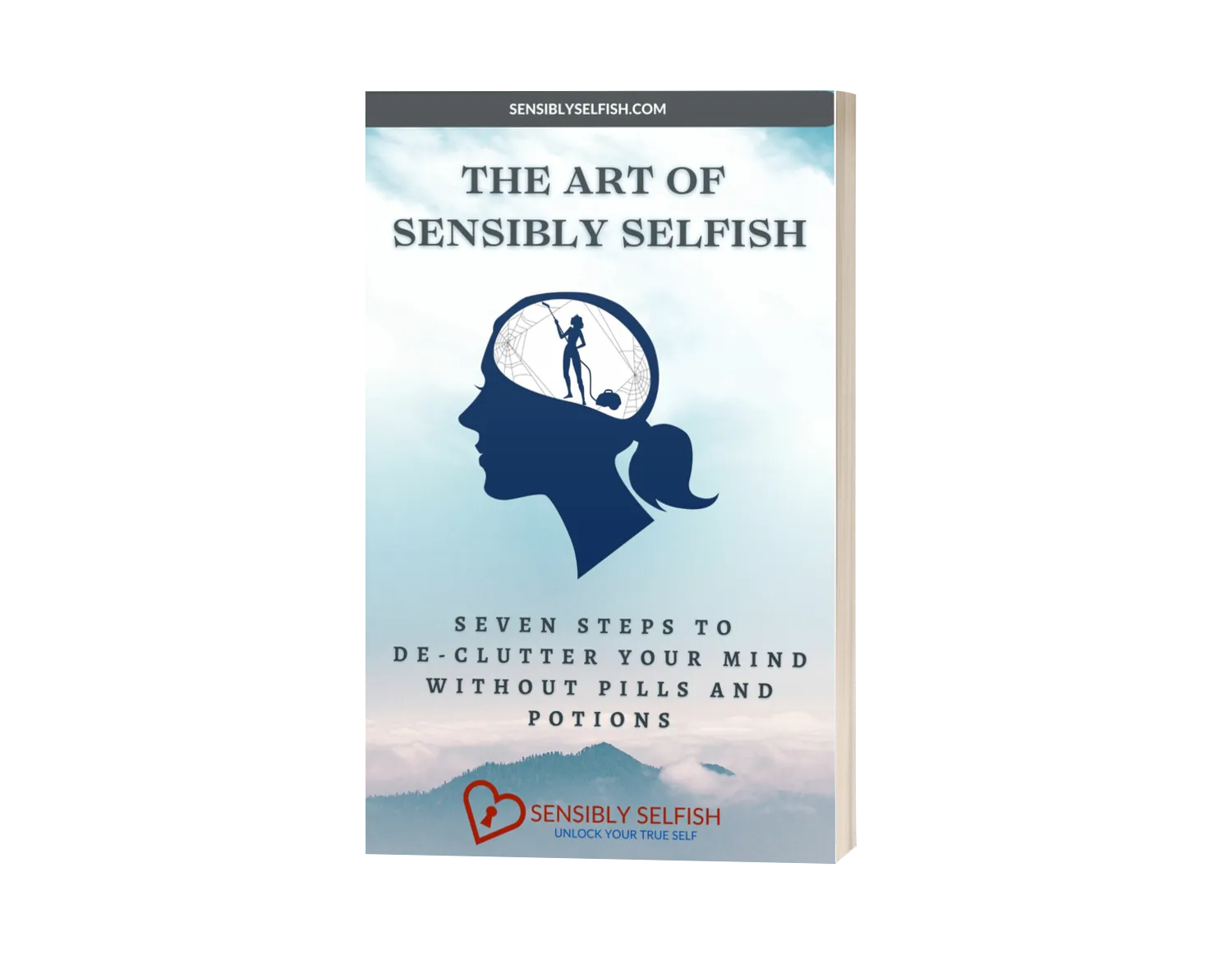Midlife Rites of Passage
A Vital Part of Being Human

Rites of Passage hold profound significance in various cultures, symbolizing transitions from one life stage to another. For women over 45, midlife represents a crucial and transformative period. It's often a time of reflection, self-discovery, and embracing new possibilities. This article delves into the essence of Rites of Passage and why introspection during midlife is Sensibly Selfish for personal growth and fulfillment.
Understanding Rites of Passage
Rites of Passage can be seen as a ceremonial event that marks significant life transitions. Historically, they symbolized the move from childhood to adulthood, but their relevance extends to various phases of life, including midlife. At this stage, women undergo profound changes, such as empty nesting, career shifts, or menopause. Acknowledging these transitions as Rites of Passage empowers women to embrace the changes and seize the opportunities they present.
Embracing Midlife Transitions
Midlife transitions can be daunting, often triggering feelings of uncertainty and doubt. However, they also offer opportunities for reinvention and growth. By embracing change, women can break free from societal expectations and pursue their passions unapologetically. The empty nest, for instance, provides a chance to reevaluate personal goals and explore new interests.

The Power of Reflection
Reflection plays a pivotal role in navigating midlife transitions. Taking time for introspection allows women to gain insights into their values, desires, and long-neglected dreams. By revisiting past experiences, successes, and challenges, they can identify patterns, strengths, and areas for growth. Reflective exercises like journaling, meditation, or the method below provide invaluable clarity and direction.
Creating Your Life History
Documenting one's life history is a profound and therapeutic process. Women over 45 can start by jotting down pivotal life events, decisions, and turning points. They can delve into how these experiences shaped them and their perspectives. Writing about the challenges they overcame and the lessons they learned provides a sense of closure and empowerment. Creating a life history helps women understand their resilience, acknowledges personal growth, and cultivates a sense of purpose for the future. However, the stories we tell ourselves about these experiences are filtered through our unique perspectives, creating both empowering and limiting narratives.
Finding Meaning and Integration
Meaning arises from interpreting life experiences and understanding how they contribute to personal growth. Finding meaning entails integrating the different chapters of their lives, recognizing their accomplishments, and making peace with past regrets. Embracing all aspects of their journey fosters a deeper understanding of self and a stronger sense of direction moving forward.

The Empowering Effect of Sharing Stories
Women over 45 possess a wealth of wisdom gathered from their unique life experiences. Sharing these stories with others, including peers and younger generations, can inspire and empower. Storytelling nurtures connections, breaks down barriers, and fosters empathy. By sharing their Rites of Passage, women can leave a lasting impact on the lives of others, sparking conversations that transcend age and culture.
Self-Compassion
By cultivating self-compassion, acknowledging their vulnerabilities, and treating themselves with kindness, women can build resilience and self-assurance to navigate any hurdles that come their way.
How to Write Your Rites
Below is a personal history exercise, where you can delve into the moments that defined you in the three stages of life: 0-30, 30-60, and 60-90. By reflecting on the emotions attached to each event and reevaluating your authenticity, you can gain valuable insights to guide you through new adventures with emotional wisdom. Remember, it's okay to revisit, change your mind and rewrite your stories to serve your highest good.
- Take a blank piece of paper or page in a journal and divide it into three sections to signify the three stages of life, (Childhood, Adulthood, and the Wisdom Year). This is a simplification of the process and you may wish to move the dates depending you your own life.
- In each of the sections, use the guide below, to list your personal life experiences and the emotions they caused. Distinguish between the rites of passage and the emotions they cause as they are NOT connected.
- Throughout your life journey, your energy levels fluctuate in response to the events you encounter. On a scale of 0 to 10, with 0 being heavy and 10 being light, assess the impact of each experience on your energy. This exercise helps you identify patterns and recognize the moments that brought joy and vitality versus those that drained your energy. Armed with this awareness, you can make conscious choices when faced with new opportunities.
Years 0-30: A Journey of Beginnings
During these formative years, you encountered numerous crossroads that shaped your identity. As you recount these experiences, you must also recognize the emotions you attached to them at the time. Did excitement lead you down a new path? Or did fear hold you back from exploring uncharted territories? Now that you look from an adult perspective, could your storytelling be different? Acknowledging the range of emotions experienced helps you understand how they influenced your decisions and growth.
Years 30-60: Embracing Maturity and Transformation
The middle stage of life brought its share of challenges and triumphs. Looking back, you may find that your perception of these events has shifted over time. Where once there was uncertainty, there is now clarity. Alongside recollecting emotions, you must assess if these feelings hold true today or if they have evolved with your understanding of self. By reevaluating these experiences, you uncover the wisdom you already possess to navigate new adventures with confidence.
Years 60-90: Embracing Wisdom and Serenity
In the final stage of life, you reflect on the paths you've taken and the lessons you've learned. The emotions you associate with these experiences may have mellowed into acceptance and gratitude. As you enter this phase, you must reexamine your emotional responses to ensure they align with your present reality. By doing so, you tap into the wealth of emotional knowledge accumulated over the years, providing you with the courage to embrace new challenges and opportunities.

Case Study: Embracing Transformation and Rediscovering Joy
Meet Liz, a dynamic and accomplished woman at the age of 53. Having just navigated the journey of menopause, she stands at the precipice of a new chapter in her life. Liz recently bid farewell to her senior executive position within the UK National Health System, stepping into early retirement with mixed emotions. As she contemplates this transition, Liz finds herself yearning to fill her newfound time with a second career, but uncertainty clouds her vision.
In her quest for a new path, Liz embarks on the Rites of Passage exercise—a reflective journey into the pivotal moments that have defined her life. Through introspection, she begins to understand that the old Liz, the ambitious and career-driven executive, has evolved into someone entirely different. She acknowledges the changes brought on by menopause as a powerful transformation, signifying the closure of one era and the beginning of another.
With newfound clarity, Liz creates an altar to honor her former self, symbolizing her acceptance of the changes she has undergone. In a beautiful act of liberation, she lights candles and lets go of the expectations and pressures that once defined her identity. As she stands before the altar and burns her Rites of Passage work, she embraces the woman she has become—graceful, content, and ready to embrace a simpler and more fulfilling life.
What arises from this transformation is a profound realization: Liz is now eager to revel in the simple joys of life. She finds happiness in pottering around her garden, cultivating nature's beauty with her hands. Books become her loyal companions, providing her with knowledge, escapism, and inspiration. Eco-travel opens up a world of exploration and adventure, reminding her she is still a curious soul, eager to discover new horizons. Above all, Liz discovers immense joy in spending quality time with her daughter and granddaughter, savoring the precious moments they share.
As the dust settles on her former career, Liz finds peace and fulfillment in her new identity—a woman who appreciates the beauty of life's little pleasures. No longer burdened by the need to pursue another career, she cherishes the freedom retirement offers. Liz's journey reminds us that life's transitions can be liberating, and accepting change can lead us to discover authentic happiness and purpose in unexpected places.

The Journey Continues: Midlife Transitions as Ongoing Self-Discovery
Midlife transitions are not merely finite events but rather continuous processes of self-discovery. Embracing change and letting go of past identities allows us to open the door to new possibilities and experiences. Life's chapters are not bound by societal timelines or expectations. Instead, they unfold organically, presenting us with opportunities to reinvent ourselves, find purpose, and uncover hidden passions. As we bid farewell to one phase of life, we step confidently into the next, armed with the wisdom gained from our unique Rites of Passage. The path forward may be uncertain, but by embracing change and self-acceptance, we open ourselves to endless possibilities. In this ever-evolving journey of self-discovery, we may find that the best is yet to come.









